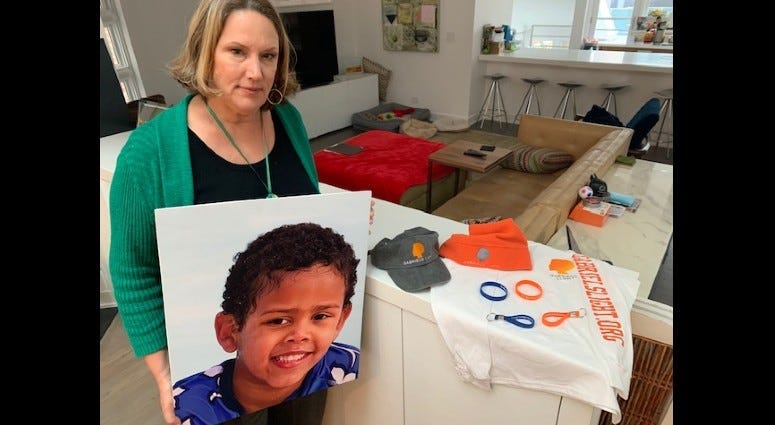
CHICAGO (WBBM NEWSRADIO) -- Carol Deely stands next to a glass dining room table inside her Lincoln Park Home. It's filled with some of her oldest son's favorite things.
"He loved making bracelets at camp, he liked old fashioned things like yo-yos and the paper fortune tellers, he loved the color orange and he loved eating skittles," she recalled.
Deely and her husband adopted Gabriel from Ethiopia in 2006 when he was only 4-months old.
"I'm one of 7 children, my husband is one of 6, so we always wanted to have a large family, but we had our third daughter a week before my 40th birthday so we decided on adopting. We brought home Gabriel a few weeks before Christmas, so he was the best Christmas gift my girls every got," she laughed. "It was a very exciting time."
The Deelys would later adopt another boy, Isaiah, also from Ethiopia.
"The boys aren't related, but they were only a few months apart," she said.
Gabriel grew up to be a normal, boisterous, chatty 12-year old.
"It started out a normal day. He came home from school, said he was going up to his room to do his homework before piano lessons. That's the last time I saw him alive," she said.
Deely found him in his room. Gabriel had taken his own life, a tragedy that she and her family couldn't grasp.
"We weren't aware of any incidents at school. We weren't aware of anything. He had recently joined the basketball team, he was about to get his braces off, he was looking forward to Christmas. We planned his funeral thinking it was an accident, that he maybe thought he'd try and couldn't get out of it. We didn't know. We had no idea," she said. "The police took his iPad, his phone, his watch and they found nothing alarming. But after everything is quiet, then you think why, the search for why."
She soon found out, he was conducting dangerous searches on his school-issued iPad.
"In there we found that he had searched suicide, he had searched bullying, he had searched inappropriate sexual content. It took our breath away," Deely said.
In a statement, The Chicago Archdiocese said St. Clement was monitoring its technology as it's required by federal law.
"It took many months for the school to make any changes which was stunning. We got two weeks of search reports. What was happening before that? We're still waiting for more search information. We want to also find the direct message history of the social media apps," Deely said.
She would also later learn that Gabe had also talked about killing himself to his friends on a few occasions.
"When I talked to some of their parents, they said when they woke their student and told them Gabe had died, they said 'I bet he killed himself, because he talked about it at school.' This was the day after he died. I don't know if they told the school. We didn't find this out until 3 months later. Apparently he masked it. He gave these signs, but treated it as if he was joking. That's why people need to see the signs and know what to do. We never saw any of this kind of behavior at home," Deely said.
Deely was getting more answers, but she knew she wanted to do more to prevent this from happening to other children and their families.
A small notebook found in Gabriel’s room was returned to her by the Chicago Police Department. That notebook contained one entry and it was from the day he died. Forensic psychologists have interpreted that Gabe felt isolated and alone at school; he felt diminished, not good enough, hopeless. There was evidence of Gabe feeling bullied.
"The fact that there were signs that he expressed. Seventy-six percent of youth tell a friend about what they're thinking about. He fell into that statistic. He told somebody. How do we get kids, parents, teachers, counselors to be more proactive?" she said.
Deely also hopes to encourage schools to be more vigilant about technology.
"You don't give somebody a set of car keys without driver's ed. You don't give somebody an electronic device without having safety measures in place or without training. These are young, impulsive kids. Based on the search results, that iPad was open all day. Kids are smart and they think of it as a challenge to get around firewalls. Schools, if they are going to issue devices, they have to take responsibility for them," she said.
Deeley said Gabe's death has given her life new meaning. Gabriel's Light has given her a new mission.
"We learned about bullying, the lack of software monitoring on the school device, and the signs of suicides that were ignored, we decided that will be our three things. We want to get the mission out there about these three things so that schools and parents will start acting and taking these precautions to keep kids safe," Deely said.
"He has a seat at the table still. He has an orange ribbon on the chair too. It's getting easier to talk and laugh than to talk and cry. We want to remember how he lived, not how he died. We want to help others avoid the circumstances that we now face. It's hard to talk about this, but it's the right thing to do," Deely said.
For more information about, visit the Gabriel's Light website.
For help, call the National Suicide Prevention Lifeline at 1-800-273-8255.
